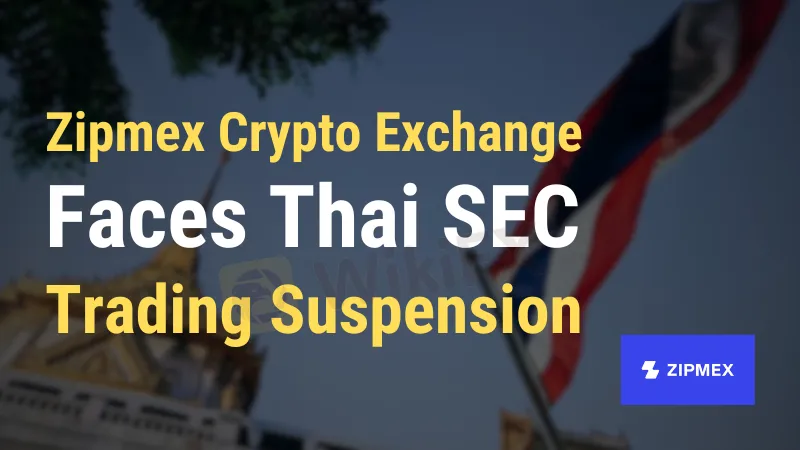简体中文
繁體中文
English
Pусский
日本語
ภาษาไทย
Tiếng Việt
Bahasa Indonesia
Español
हिन्दी
Filippiiniläinen
Français
Deutsch
Português
Türkçe
한국어
العربية
Zipmex Crypto Exchange Faces Thai SEC Trading Suspension
Abstract:Thai SEC halts Zipmex crypto trading over compliance issues. Urgent reforms were demanded within 15 days to protect consumer funds and rectify financial operations.

Thailand's financial watchdog, the Securities and Exchange Commission (SEC), has issued a directive to Zipmex, a prominent cryptocurrency exchange, ordering an immediate stop of trading and brokerage activities. This dramatic decision follows the SEC's prior request on January 12, in which it requested Zipmex to reconsider its strategy to preserve liquid capital and reorganize its management system. Despite the allotted time, the SEC's examination on February 1 indicated that Zipmex's efforts fell short of satisfying the standards.
Zipmex, located in Singapore, now has a key 15-day window to fix its financial issues and implement effective safeguards to protect consumer funds from possible exploitation. The exchange is required to demonstrate significant changes in its operational structure and financial health to the SEC throughout this time. The SEC's approval post-review of the filed remedial actions will determine whether Zipmex may continue operations.
Zipmex said that it has already suspended its trading and deposit services in response to the SEC's strict mandate. Additionally, the exchange has advised its customers to remove their assets, mirroring earlier statements issued in December and January.

Zipmex's path through financial instability started in July 2022 with a temporary halt on withdrawals, prompted by the domino effect of the Terra ecosystem collapse and the following demise of other cryptocurrency lending companies. Faced with substantial financial failures, Zipmex sought creditor protection and launched a capital-raising campaign.
To overcome its financial difficulties, Zipmex proposed a restructuring plan in November 2023, proposing an initial payback rate of around 3.35 cents for every dollar of claims filed. This payback rate has the potential to rise to 29.35 cents per dollar if the updated restructuring plan is carried out successfully. However, this suggestion was greeted with opposition from important creditors, who demanded a thorough assessment of the exchange's financial position.
Zipmex filed for bankruptcy protection in Singapore in 2022, owing $97.1 million. The exchange's troubles were exacerbated by its $53 million exposure to troubled cryptocurrency lenders Babel Finance and Celsius. Amid these problems, Zipmex has aggressively sought court reprieves to prolong its debt moratorium, and to develop a sustainable recovery and payback plan.
A once-promising acquisition option that might have infused $100 million into Zipmex fizzled last year when the potential buyer, V Ventures, withdrew its bid.
Zipmex operates in Thailand, Australia, and Indonesia and is under regulatory investigation, primarily from Thailand's SEC. The regulatory authority has expressed worry over Zipmex Thailand's alleged mishandling of a digital asset custodian service, as well as possible conflicts of interest caused by referring clients to its Singapore-based equivalent, Zipmex Pte.
For the most recent updates and complete news coverage of this breaking subject, readers can check WikiFX daily news.

Disclaimer:
The views in this article only represent the author's personal views, and do not constitute investment advice on this platform. This platform does not guarantee the accuracy, completeness and timeliness of the information in the article, and will not be liable for any loss caused by the use of or reliance on the information in the article.
Read more

How Crypto Trading Transforms FX and CFD Brokerage Industry
Explore how crypto trading reshapes FX and CFD brokerage with innovative products, liquidity solutions, and regulations in 2025.

Why More People Are Trading Online Today?
Discover why online trading is booming with tech, AI, and a push for financial freedom. From stocks to crypto, it’s a thrilling hustle for all.

SEC Ends Crypto.com Probe, No Action Taken by Regulator
The SEC has closed its investigation into Crypto.com with no action taken. Crypto.com celebrates regulatory clarity and renewed momentum for the crypto industry.

Interactive Brokers Expands Crypto Trading with Solana, XRP, Cardano, and Dogecoin
Interactive Brokers adds Solana, XRP, Cardano, and Dogecoin to its platform, enabling U.S. and U.K. clients to trade crypto 24/7 with low fees.
WikiFX Broker
Latest News
Interactive Brokers Expands Crypto Trading with Solana, XRP, Cardano, and Dogecoin
Fidelity Investments Explores Stablecoin Innovation in Digital Assets Sector
Why More People Are Trading Online Today?
SEC Ends Crypto.com Probe, No Action Taken by Regulator
How Crypto Trading Transforms FX and CFD Brokerage Industry
UK would not hesitate to retaliate against US tariffs - No 10 sources
Gold Surges to New Highs – Is It Time to Buy?
Bitpanda Secures Full Broker-Dealer License in Dubai
Lost Money to Scam Recently?! This Article Could Help You!
Navigating the Intersection of Forex Markets, AI Technology, and Fintech
Currency Calculator







